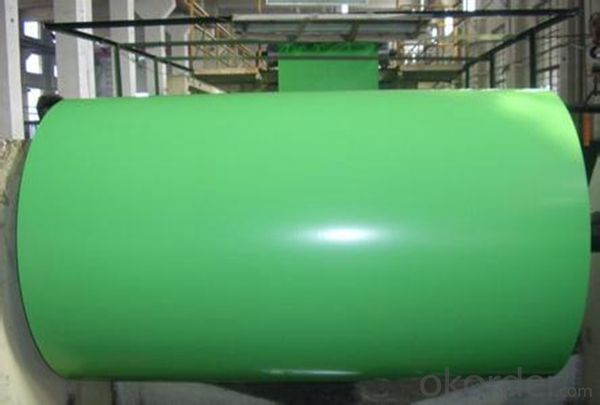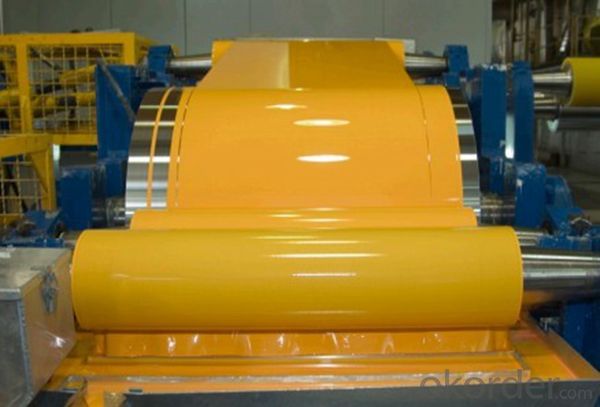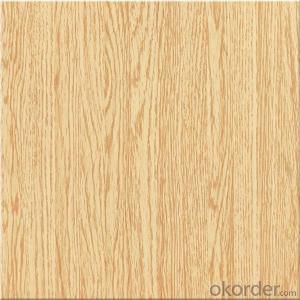Wooden Grain Coating Aluminium Coil AA3003 for Ceiling
- Loading Port:
- Shanghai
- Payment Terms:
- TT OR LC
- Min Order Qty:
- 5 m.t.
- Supply Capability:
- 10000 m.t./month
OKorder Service Pledge
OKorder Financial Service
You Might Also Like
Item specifice
1. Specification of Wooden Grain Coating Aluminium Coil AA3003 for Ceiling
characteristics | Application |
1) Super peeling strength | 1) Building exterior curtain walls |
2) Excellent surface flatness and smoothness | 2) Decoration and renovation additions for old buildings |
3) Superior weather, corrosion, pollutant resistance | 3) Decoration of interior walls, ceilings, bathrooms, kitchens and balconies |
4) Even coating, various colors | 4) Shop door decorations |
5) Fireproof, excellent heat and sound insulation | 5) Advertisement board display platforms and signboards |
6) Superior impact resistance | 6) Wallboards and ceilings for tunnels |
7) Lightweight and easy to process | 7) Industrial materials, materials for vehicles and boats |
2. Application of Wooden Grain Coating Aluminium Coil AA3003 for Ceiling
(1).Interior: wall cladding, ceilings, bathrooms, kitchens and balconies, shutters, doors...
(2).Exterior: wall cladding, facades, roofing, canopies, tunnels, column covers , renovations...
(3).Advertisement: display platforms, signboards, fascia, shop fronts...
3. Feature of Wooden Grain Coating Aluminium Coil AA3003 for Ceiling
• Our goods quality is top, the surface is smooth, and every steel coil
• No Joint, No Bends, no spots, no roller marks.
• MTC will be provided with goods, third part inspection is acceptable, for example, SGS, BV. Etc
Be free from Oil Stain, Dent, Inclusion, Scratches, Stain, Oxide Dicoloration, Breaks, Corrosion, Roll Marks, Dirt Streaks and other defect which will interfere with use
4. Certificate:
SGS and ROHS(if client request, paid by client), MTC(plant provided), Certificate of Origin(FORM A, FORM E, CO), Bureau Veritas and SGS (if client request, paid by client), CIQS certificate
5. Image of Wooden Grain Coating Aluminium Coil AA3003 for Ceiling


6. Package and shipping of Wooden Grain Coating Aluminium Coil AA3003 for Ceiling
eye to wall
eye to the wall
with wood pallet (wooded case also available)
7. FAQ
1) What is the delivery time?
Dpends on actual order, around 20 to 35 days
2)What is the QC system:
We have QC staff of 20 persons and advanced equipment, each production is with MTC traced from Aluminum ingot lot.
3) What market do you mainly sell to?
Australia, America, Asia, Middle East, Western Europe, Africa etc
- Q:What are the different coil slitting methods for aluminum coils?
- Aluminum coils can be slit using various methods, each with its own advantages and suitability for different applications. Some commonly used methods for slitting aluminum coils are as follows: 1. Rotary Shear Slitting: This method involves the use of a rotating knife or shear blade to cut the aluminum coil into narrow strips. It is suitable for high-speed production lines and provides accurate and clean edges. 2. Looping Slit: In this method, the aluminum coil is looped and passed through rotating circular blades that cut it into desired widths, ensuring precise cuts. It is commonly used for thin aluminum coils and offers good accuracy and productivity. 3. Double Knife Slitting: Also known as duplex slitting, this method uses two circular knives positioned on top and bottom of the aluminum coil. The knives move in opposite directions, cutting the coil into multiple strips simultaneously. It is suitable for high-volume production and provides excellent accuracy and efficiency. 4. Razor Slitting: This method utilizes razor-sharp blades mounted on a rotating shaft to cut the aluminum coil. It is particularly suitable for thinner gauge coils and provides clean, burr-free edges. 5. Crush Slitting: Crush slitting involves compressing the aluminum coil between two rotating rolls with sharp edges. The pressure exerted by the rolls cuts the coil into desired widths. It is commonly used for thicker gauge coils and offers good productivity and edge quality. 6. Laser Slitting: Laser slitting uses a high-powered laser beam to cut the aluminum coil. This method offers exceptional precision and accuracy, making it ideal for intricate and complex cutting requirements. The choice of slitting method depends on factors such as coil thickness, desired strip widths, production volume, and edge quality requirements. Each method has its own advantages and limitations, so it is important to evaluate these factors in order to select the most appropriate slitting method for a specific application.
- Q:How do aluminum coils perform in high humidity environments?
- Aluminum coils perform well in high humidity environments due to their inherent resistance to corrosion. Unlike many other metals, such as iron or steel, aluminum does not rust when exposed to moisture. This makes it a suitable choice for applications where high humidity is a concern, such as air conditioning systems or refrigeration units. The corrosion resistance of aluminum is primarily due to the formation of a thin layer of aluminum oxide on its surface when exposed to oxygen. This oxide layer acts as a protective barrier against further oxidation, preventing the metal from deteriorating even in humid conditions. Moreover, the lightweight nature of aluminum allows for better heat transfer and energy efficiency in cooling systems. This property makes aluminum coils a popular choice as heat exchangers, as they can effectively transfer heat from the air or fluid passing through them. Additionally, aluminum coils are typically coated with a protective layer or treated with a corrosion-resistant coating to further enhance their performance in high humidity environments. These coatings provide an extra layer of protection against moisture and other corrosive elements, ensuring the longevity and reliability of the coils. In summary, aluminum coils are highly suitable for high humidity environments due to their resistance to corrosion and their efficient heat transfer properties. The combination of these factors makes them a reliable choice for various applications where moisture is a concern.
- Q:What are the maximum and minimum coil weights available?
- The specific type of coil being referred to can cause variations in the available maximum and minimum coil weights. When considering electrical coils, such as those utilized in transformers or motors, factors like wire size, material, number of turns, and intended application determine the maximum and minimum coil weights. Manufacturers generally set weight limits on these coils, which can range from small and lightweight to large and heavy. For instance, a small coil may have a maximum weight of a few grams, while a larger coil could weigh several kilograms. To ascertain the maximum and minimum coil weights for a specific application, it is essential to consult the manufacturer or supplier's specifications.
- Q:What can I get easily at Home Depot that will successfully bond rubber to aluminum?? I have tried several things with no success! Surely, there must be some sort of construction adhesive to do the job.Thanks!
- have you tried a strong adhesive such as crazy glue? i'm sure that'll bond to anything but try sand down the rubber before you put on the glue so it holds, hope i've helped?
- Q:How do aluminum coils compare to other types of metal coils?
- Aluminum coils are lighter in weight compared to other types of metal coils, making them easier to handle and install. They also have excellent corrosion resistance, ensuring durability and longevity. Additionally, aluminum coils have good thermal conductivity, allowing for efficient heat transfer. However, they may have lower tensile strength compared to certain other metal coils. Overall, aluminum coils offer several advantages and are commonly used in various industries including HVAC and automotive.
- Q:What is the thickness tolerance of aluminum coils?
- The thickness tolerance of aluminum coils can vary depending on the specific manufacturing process and industry standards, but it is typically within a range of +/- 0.005 to 0.010 inches.
- Q:Can aluminum coils be used in the manufacturing of window frames?
- Yes, aluminum coils can be used in the manufacturing of window frames. Aluminum is a lightweight, durable, and corrosion-resistant material, making it a popular choice for window frames. Coils allow for efficient production and customization of window frame shapes and sizes.
- Q:What are the different coil leveling options available for aluminum coils?
- Aluminum coils can be leveled using various methods, depending on the specific needs of the application. These options include roller leveling, stretch leveling, tension leveling, and precision leveling. Roller leveling is a commonly used technique that involves passing the coil through a series of rollers. These rollers apply pressure to gradually reduce the thickness of the material and correct any imperfections. This method is efficient and can accommodate different coil sizes and thicknesses. Stretch leveling, on the other hand, involves controlled stretching of the aluminum coil. Powered rollers elongate the material, removing residual stress and improving flatness. This method is particularly effective for thicker and wider coils. Tension leveling utilizes tension to eliminate waviness or unevenness in the coil. The material is passed through bridle rolls that apply tension, resulting in a flattened coil. This technique is commonly used for thinner gauges of aluminum and allows for high-speed processing. For high-precision applications, precision leveling is recommended. This specialized process combines roller leveling, stretching, and tensioning techniques to achieve extremely flat and uniform coils. Industries such as aerospace, automotive, and electronics often rely on precision leveling. Overall, the choice of leveling method for aluminum coils depends on factors like desired flatness, thickness, width, and application requirements. Each technique has its own advantages and limitations, so it is crucial to select the most suitable option to ensure the production of high-quality end products.
- Q:Are aluminum pie pans and aluminum foil considered green products? They are most certainly recyclable. Thanks.?
- Surely that depends on how 'green' you want to be. There's the 'end user green' which just says, 'well this is recyclable so it's green', or there's the whole subject of whether we should be encouraging throw away products which rely on unsustainable minerals or rock such as the bauxite that is used to make aluminium (aluminum). And what would be the effect if we said no more aluminium, and bauxite was no longer allowed to be mined? What happens to those people who earn a living from mining it, and what do we replace it with? Green is a very complicated concept!
- Q:Why are the aluminum coils sticky after annealing?
- There is oil or the annealing time is too long!
1. Manufacturer Overview |
|
|---|---|
| Location | |
| Year Established | |
| Annual Output Value | |
| Main Markets | |
| Company Certifications | |
2. Manufacturer Certificates |
|
|---|---|
| a) Certification Name | |
| Range | |
| Reference | |
| Validity Period | |
3. Manufacturer Capability |
|
|---|---|
| a)Trade Capacity | |
| Nearest Port | |
| Export Percentage | |
| No.of Employees in Trade Department | |
| Language Spoken: | |
| b)Factory Information | |
| Factory Size: | |
| No. of Production Lines | |
| Contract Manufacturing | |
| Product Price Range | |
Send your message to us
Wooden Grain Coating Aluminium Coil AA3003 for Ceiling
- Loading Port:
- Shanghai
- Payment Terms:
- TT OR LC
- Min Order Qty:
- 5 m.t.
- Supply Capability:
- 10000 m.t./month
OKorder Service Pledge
OKorder Financial Service
Similar products
New products
Hot products
Related keywords




























